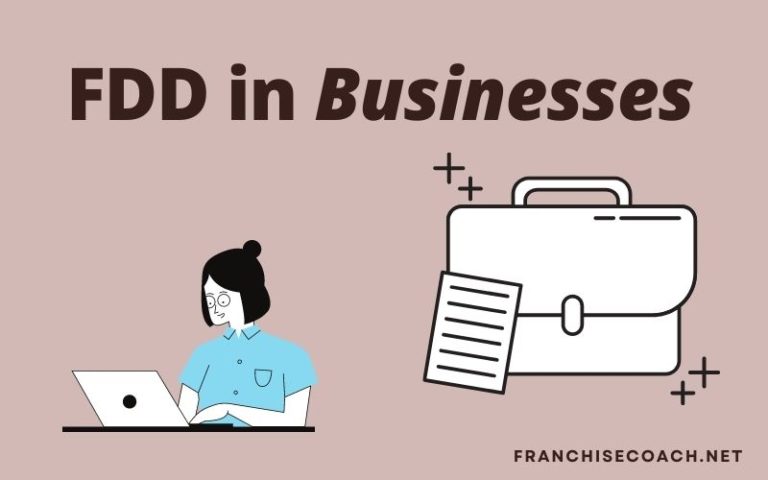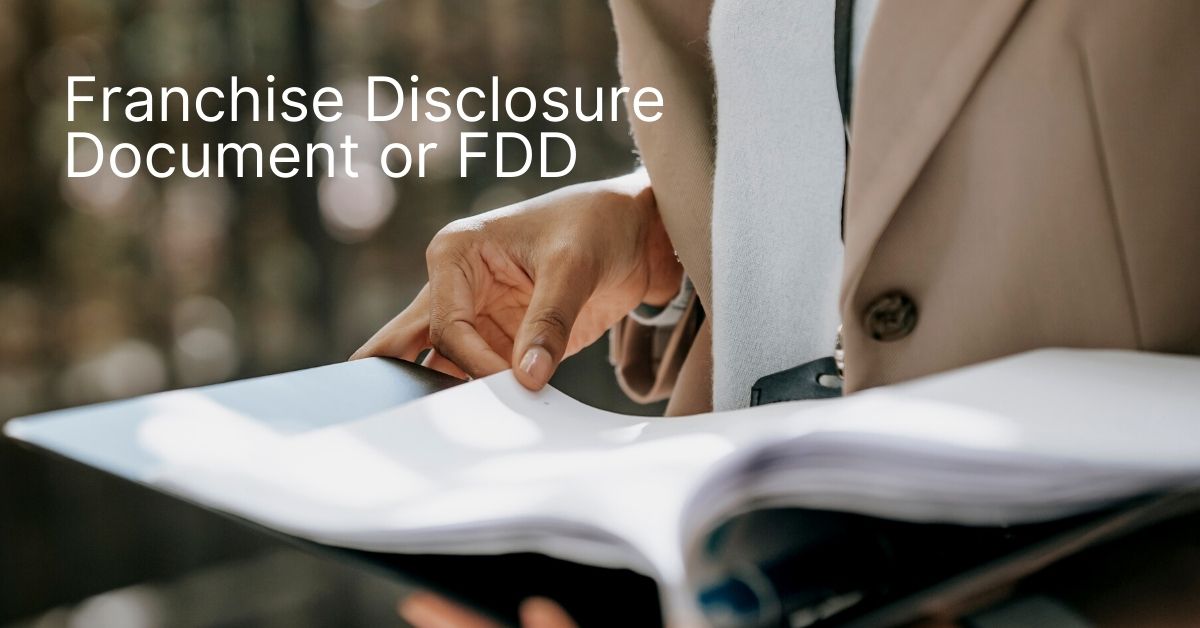Franchising has become a popular business model for entrepreneurs like you who are looking to start a venture. It offers the opportunity to operate a business under an established brand with proven systems and support.
However, entering into a franchise agreement involves a significant commitment of time, effort, and capital. To ensure transparency and protect both franchisors and franchisees, a vital document called the Franchise Disclosure Document (FDD) is used.
In this blog post, we will explore the Franchise Disclosure Document, its contents, and its significance in the franchising industry.
What is in a Franchise Disclosure Document?
The FDD (formerly known as Uniform Franchise Offering Circular) is a comprehensive document the franchisor must provide to potential franchisees. Its purpose must disclose essential information about the franchise opportunity.
The FDD typically includes comprehensive information about the franchisor’s background, financial statements, and other relevant details. The FDD is a legal document required by law in many jurisdictions and is designed to ensure transparency and protect potential franchisees.
Just to clarify, the FDD and the franchise agreement are two separate documents that are both important in the franchising process. The FDD gives detailed information for potential buyers to evaluate the franchise opportunity, while the franchise agreement focuses on the legal rights and obligations of both parties after entering into the franchise relationship.
So it is important for people interested in becoming franchisees to closely examine both papers, preferably with the help of legal experts so that they have a complete comprehension of the franchise’s conditions and requirements before committing.
How many items are in a Franchise Disclosure Document?

The number of items in a Franchise Disclosure Document can vary, as it depends on the specific requirements of the governing franchise laws in each country or state. However, the FDD typically consists of 23 distinct items that provide comprehensive information about the franchise opportunity.
The following are the disclosure items:
Item 1: The Franchisor and Its Predecessors
Background information about the franchisor, its history, key executives, and any predecessor companies.
Item 2: Business Experience
Details about the business experience of the franchisor’s key executives, including their involvement in other franchise systems.
Item 3: Litigation History
Discloses information about any past or pending litigation involving the franchisor, its officers, or affiliates.
Item 4: Bankruptcy
The franchisor must disclose this item if its key executives have a history of bankruptcy.
Item 5: Initial Fees
Outlines the initial fees required to become a franchisee, such as the franchise fee, training fees, or other upfront payments.
Item 6: Other Fees
Provides information about ongoing fees and expenses, including royalties, advertising fees, technology fees, or any other recurring payments required from franchisees.
Item 7: Estimated Initial Investment
This gives an estimate of the total investment needed to start the operation of the franchise, including the initial fees, equipment costs, leasehold improvements, and other related expenses.
Item 8: Restrictions on Sources of Products and Services
Discloses any restrictions or requirements regarding the purchase of products or services from specified suppliers.
Item 9: Franchisee’s Obligations
Outlines the obligations and responsibilities of the franchisee, including operational standards, marketing requirements, reporting obligations, and compliance with the franchisor’s policies.
Item 10: Financing
If the franchisor offers financing options or assists franchisees in obtaining financing, this item provides relevant details.
Item 11: Franchisor’s Assistance, Advertising, Computer Systems, and Training
Describes the support and training programs provided by the franchisor, as well as any advertising or marketing assistance available to franchisees.
Item 12: Territory
Explains the territory rights granted to the franchisee, including the geographic area in which the franchisee can operate and any limitations or exclusivity associated with the territory.
Item 13: Trademarks and Intellectual Property
Provides information about the franchisor’s trademarks, copyrights, patents, and other intellectual property rights associated with the franchise system.
Item 14: Patents, Copyrights, and Proprietary Information
Discloses any patents, copyrights, or proprietary information that franchisees will have access to as part of the franchise system.
Item 15: Obligation to Participate in the Actual Operation of the Franchised Business
Clarifies whether franchisees are required to actively participate in the day-to-day operations of the franchise.
Item 16: Restrictions on What the Franchisee May Sell
Details any restrictions on the products or services that franchisees are allowed to sell within the franchise system.
Item 17: Renewal, Termination, Transfer, and Dispute Resolution
Outlines the conditions and procedures for renewing the franchise agreement, terminating the agreement, transferring ownership, and resolving disputes between the franchisor and franchisee.
Item 18: Public Figures
If the franchisor uses public figures or celebrities in its advertising or promotion, this item must disclose any relevant information.
Item 19: Financial Performance Representations (if provided)
An optional item that allows the franchisor to provide information about the financial performance of its existing franchise locations.
Item 20: Outlets and Franchisee Information
Provides a list of current and former franchisees, as well as their contact information.
Item 21: Financial Statements
Includes the franchisor’s audited financial statements, which provide insights into its financial health and stability.
Item 22: Contracts
Provides copies of the franchisor’s standard franchise agreement, any ancillary agreements, and other contracts that franchisees will be required to sign.
Item 23: Receipts
A document for the franchisee to sign acknowledging their receipt of the FDD.
FDD Significance in Franchising

The Franchise Disclosure Document is a crucial aspect of the franchising industry due to its transparency and role in negotiations. By using this detailed information, individuals interested in franchising can make informed decisions that will enhance their likelihood of succeeding in the industry.
Furthermore, the FDD enables potential buyers to thoroughly evaluate the risks, costs, and obligations associated with the franchised business.
Promotes Transparency
Transparency is a fundamental aspect of the Franchise Disclosure Document (FDD). By providing detailed information about the franchise business opportunity, the FDD ensures transparency between the franchisor and the potential franchisee.
Here’s how the FDD promotes transparency in franchising:
Comprehensive Information
The FDD contains a wealth of information about the franchisor, including its history, audited financial statements, litigation history, and more. It also provides details about the franchise system’s parents, predecessors, and affiliates, the initial investment required, ongoing fees, territory rights, and other important aspects of the business. This comprehensive information empowers potential franchisees to make informed decisions based on a clear understanding of the opportunity.
Risk Assessment
The FDD requires that the franchisor must disclose any material risks associated with the operation of the franchise business. This can include potential challenges, competition, market conditions, or any other factors that may affect the success of the business. By presenting these risks upfront, potential franchisees can assess them and determine if they are comfortable with the level of risk involved.
Cost Evaluation
The FDD typically includes a reference table that provides a summary of important information about the costs and fees associated with the franchise, including the initial franchise fee, equipment, inventory, royalties, advertising fees, and more. This transparency allows potential franchisees to evaluate the financial obligations of the franchise business and assess its affordability and profitability.
Legal Compliance
The FDD is a legal requirement in many jurisdictions, mandating franchisors must disclose accurate and complete information. This helps prevent fraudulent or deceptive practices by ensuring that potential franchisees have access to all necessary information before committing. Franchisors who fail to provide the required disclosures can face legal consequences, further reinforcing the importance of transparency.
Due Diligence
The FDD allows potential franchisees to conduct thorough due diligence on the franchisor and the franchise system. They can review the financial performance representations, speak with existing franchisees, and consult legal and financial professionals to validate the information provided. This allows potential franchisees to verify the claims made by the franchisor and make informed decisions based on reliable information.
FDD Role in Negotiations
The FDD serves as a negotiation tool, providing potential franchisees with critical information that they can use to discuss terms, conditions, and potential modifications with the franchisor.
When considering a franchise opportunity, a prospective franchisee may have specific needs, concerns, or preferences that they would like to address before signing the franchise agreement. Franchise Disclosure Documents empower them by offering comprehensive information that can be used as a foundation for negotiation.
Here’s how the FDD aids in the negotiation process:
Understanding the Terms:
Potential franchisees should understand the length of the initial term and any requirements or conditions for renewal. They can thoroughly review these terms and identify areas where they may seek modifications or adjustments to better suit their needs and capabilities.
If the term or renewal conditions are unfavorable, prospective franchisees can discuss alternatives or negotiate for more favorable terms. The franchisor must be open to discussing and potentially modifying certain terms to accommodate the needs and concerns of potential franchisees. Open communication, transparency, and a willingness to find mutually beneficial solutions are key to successful negotiations and establishing a solid foundation for the franchise relationship.
Financial Projections
Some franchisors provide financial performance representations in the FDD, which offer insights into the potential profitability of the franchise. Armed with this information, potential franchisees can assess the financial viability of the opportunity and engage in discussions regarding revenue projections, expense management, or other financial aspects.
Support and Training
The FDD details the training and support programs provided by the franchisor. Potential franchisees can assess the adequacy of the support and negotiate additional training, ongoing guidance, or assistance based on their specific requirements.
Territory Considerations
The FDD may specify the territory rights granted to the franchisee. If the potential franchisee feels that the designated territory is too restrictive or would prefer exclusive rights, they can engage in discussions with the franchisor to negotiate modifications to the territory agreement.
Franchisee’s Obligations
The FDD outlines the franchisee’s obligations, such as ongoing fees, and advertising contributions. If potential franchisees have concerns or suggestions regarding these obligations, they can use the FDD as a starting point for negotiation and propose modifications that align with their expectations.
Pay attention to any specific concerns or areas where modifications may be desired. If the franchisor agrees to your proposed modifications, ensure that any agreed-upon changes are formalized in writing and incorporated into the franchise agreement.
This helps establish clarity and ensures that both parties are aligned moving forward.
So, when can you request Franchisor Disclosure?

As per the Federal Trade Commission, the franchisor must provide the Franchise Disclosure Document (FDD) to potential franchisees at least 14 days before they sign a franchise agreement or make any payments.
The 14-day period commences once the prospective franchisee signs the FDD receipt page, which is Item 23 in the document. This ensures that potential franchisees have sufficient time to review the FDD and make an informed decision before committing to the franchise agreement or any financial obligations.
Here are some typical instances where you can request an FDD:
- Discovery Process
- Pre-Qualification
- Before Signing the Franchise Agreement
Final Takeaways
The Franchise Disclosure Document is a vital component of the franchising industry and an essential tool for franchisors and franchisees. It provides potential franchisees with detailed information about the franchise opportunity, including fees, risks, financial projections, territory rights, and more.
The FDD promotes transparency by ensuring that all relevant information must disclose upfront, allowing potential buyers to assess the opportunity and make informed decisions that align with their goals and expectations.
It also provides potential franchisees with the opportunity to conduct due diligence, engage in productive negotiations, and gain a better understanding of the franchisor’s and the franchisee’s obligations.
Additionally, the FDD serves as an invaluable tool for potential franchisees looking to make informed decisions about their investments.
Be aware that, as required by the law, the franchisor must provide the FDD to potential franchisees within a certain timeframe, depending on the laws of the jurisdiction in which they operate. This typically happens before any binding agreement is signed or payment is made.
Therefore, it’s important to carefully review and comprehend the FDD before proceeding.

